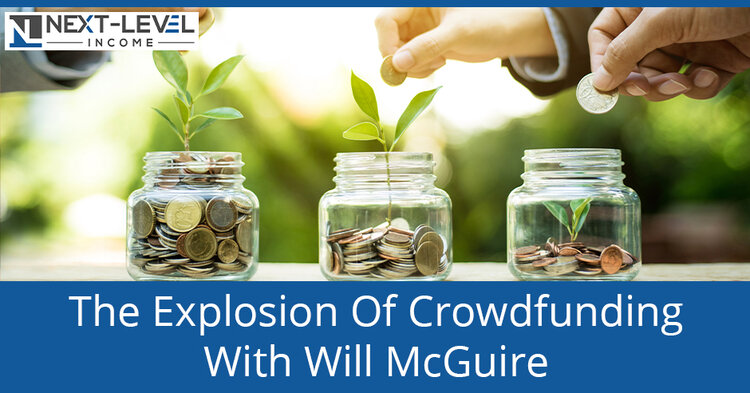Subscribe to The Next-Level Income Show
Thanks To The Internet, Raising Funds To Grow A Business Has Become Much More Efficient.
The network effect and expanding variety of financial applications allowed many people to leverage what the internet can do to the fullest, giving birth to investment crowdfunding. Will McGuire joins Chris Larsen to share how he discovered this realm that led to him building CrowdfundNC, which is now rebranded as Incolo.
Will explains how crowdfunding has become a preferred fundraising method by many, especially when its ability to invest in various companies was democratized. Will also shares his thoughts about the East Coast becoming the new Silicon Valley and how the constant growth of crowdfunding impacts this development.
Watch The Episode Here:
Listen To The Podcast Here:
The Explosion Of Crowdfunding With Will McGuire
On the show, we have Will McGuire of Incolo. Will has invested in over 70 startups and been an advisor to several since 2016. His goal is to improve community awareness and access to private marketplaces. Blending traditional and newer models, Will believes our region is at the ground floor of one of the greatest growth periods it has ever seen which will be led by a community of individuals, families, entrepreneurs and partners who build great companies & reinvest together.
—
Will, welcome to the show.
I’m happy to be here.
I’m excited to have this conversation. I talked about in the intro how you are running Incolo. We are going to get into why the name changed and what crowdfunding is. Before we do that for the audience if you don’t mind, share more about your background and how you ended up in the role you are now.
Thank you for letting me be on here. I went to NC State. I was in my senior year, we were shutting down Hillsborough Street for all the street festivals. We raised money for a charity that kicked off-street construction for that area. We had multiple stages up. It was a lot of fun. I was finishing out Aerospace Engineering and doing Application Programming. In my Entrepreneurial class, we were trying to find out how to grow hops for beer production and other things like that commercially in North Carolina because they were looking for a new cash crop.
Lo and behold, I was engaged to my fiancé at the time and my wife now. She was in the ministry. I said, “After I graduate, I can pretty much follow her anywhere. As long as she doesn’t get a call in Alaska, I can do event production and technology and we can brew beer. It would be great.” She got a call up at Richmond, Virginia, where I worked for a global company at the time, program work on big systems. I worked with a large media company in the US. People probably recognize it during the Berkshire Hathaway acquisition. I worked for one of the largest renewable companies that do a bunch of hydro plants across the US and Canada. I was working with an acquisition firm up in New York. I was doing more of the management of their application team’s website. All of that led me to another company and they were a public-benefit corp, which a lot of people were like, “What is a public-benefit corp?” I tell them, “It’s a company that wants to do more with their money than just money to the man.”
Good examples of public-benefit corp are Patagonia and Newman’s Own. They put their companies in a way where they do great business but they want to do something else with the net profit. People work probably where they’re called to but they do something different than net profit. When I was working with that consulting firm that had set up a consulting firm no different than Bain or BCG in that world, it led me into this other world that I found called investment crowdfunding where anybody can be an investor. I thought, “This is cool. I can put the money in the stock market, but I didn’t know I could diversify in tech companies that were not on the stock market. I didn’t know that world existed.”
About what year was that?
2016 was the first time I got into that. Moving forward after that, I was down at the end of the valley because we were trying to figure out how to get back down to North Carolina. I saw tons of founders complained about the lack of access to capital. I was looking down at my portfolio on my cell phone. I was like, “I’ve got twelve companies in here that are in California, Texas and Boston that have all raised money from the crowd. They were not breweries and restaurants. They were FinTech, AgTech and MedTech.” Some of those companies have probably exited now. I could not figure out why this wasn’t going on in North Carolina. My whole motivation was, “I’m going to allow founders to tap into the capital from their community and then leverage that crowd to help them grow as companies.” That was the whole auspices for starting what is now Incolo. It was CrowdfundNC at the time when we started.
That was how we got connected through the venture capital space and the entrepreneurial space. You changed the name to Incolo from CrowdfundNC. Before we get into what crowdfunding is, and it’s still in its infancy as far as I’m concerned, what is Incolo and why was the name changed?
It’s Incolo because we wanted a brand that better represented what we did. I won’t call it an accident but it came by in a unique way. We were sitting at a rebranding exercise for the team. On the first day, we were throwing adjectives up on the board. One of the adjectives was juicy because we worked with a lot of little people too that are learning about this world of building businesses. One of them said, “What we do is juicy.” We had a couple of others out there, innovative, connected, community, locality and the whole slew of them. One of our team members said, “We have to combine some of these.” Our team member went up to the board, threw those three together and went, “Incolo.” I shrugged it off to be honest with you because I was like, “It can’t be that easy.” That was literally what was going through my head.
The innovative, connected and local, is that it?
Yes, or community. The founders we talked to have said, “Keep it nondescript so they are going to interject their own words in there, Incolo.” Anya was the one who went up to the board and went, “Incolo.” Two days later as we were thinking through brand names, we couldn’t find what we all liked. We said, “Why don’t we go back to that Incolo name?” Anya was on her computer and she was like, “Guys, incolo is a word.” We were like, “What?” It’s actually a word that means to cultivate. I was like, “Hands down, that’s exactly what we are doing. We are cultivating communities.”

Crowdfunding: Regulation A+ allows companies to raise up to $75 million. Now, regulation crowdfunding allows any founder to raise to $5 million.
How about that? I had no idea. I’m looking it up and I’m like, “Is this really?” I thought it was the name that you guys came up with. That was pretty wild. That is perfect for what you do, Incolo. We touched on crowdfunding and I heard of this crowdfunding through one of the platforms where you can fund. The first thing that I looked into was one of the first smartwatches before the Apple Watch came out. I was like, “This is cool. You can fund this company but it’s so much more.”
A lot of our readers are fairly familiar with what a Reg D 506(b) or 506(c) offering is. You probably know what a stock and bond are. You may not know what a private offering or private placement is. A 506(b) or 506(c) offering is a private placement. It typically has to be accredited. A 506(b) have a relationship with somebody within the organization to be able to invest. They have expanded some definitions and platforms to allow people to have access to space. At Next-Level Income, we like to say, “Invest as the rich does.” The rich likes to invest in these private placements. Talk about how crowdfunding and some of the regulations have taken this a step further to democratize the ability to invest in these companies.
The whole industry started out back when AngelList got started and people are familiar with that platform. They were like, “We work with investors together. They were accredited. We put them into these 506(b) offerings.” A lot of the tech companies that people are familiar with that are on the stock market were probably part of an AngelList round. You can go to the website and see it. Around that same time, the whole point of that is a lot of these people who wanted to democratize the capital were going with the argument of like, “Why is it legal for somebody to take their entire paycheck or life savings and go put it in a lottery ticket in their corner store or they are going to put some of that in Vegas but they can’t even take $100 and go invest it in a startup company, commercial real estate or something that is in the private markets in the backyard?”
It took four years and they approved the Regulation of Securities Exemption similar to a 506(b) or more akin to 506(c) where you can publicly solicit. The only difference is that a founder can raise at that time up to $1,070,000 from anybody on friendly-founder terms. That could be equity or debt. That could be a debt-based instrument like a revenue share. I’m not sure if people are familiar with that or not but a company carves off a portion of the revenue to pay back the return. What was neat about that is flash forward to now, we’ve got almost $1 billion. It has not surpassed $1 billion raised across regulation crowdfunding to this other one called Regulation A+, which allows companies to raise up to $75 million. Now, regulation crowdfunding allows any founder to raise up to $5 million. That all changed last March 15th, 2021 or at least two Regs that I know that closed out $5 million within the first week.
Talk about the mechanics of that. If I want to go buy a stock, I go on my Fidelity account, Robinhood or one of these. Now, it’s similar. When I started investing in the stock market, we were coming out of the period where you had round lots, where you had to buy 100 shares at a time. We had odd lots and there were these high broker fees. Schwab was when I started investing and they had this ability. Now, with Robinhood, you can buy a fraction of a share down to almost cents worth or a couple of bucks worth. How do these mechanics work? If somebody says, “This is interesting,” how does that work to get the money out of my hand into the founder’s hand?
It’s very similar to the way people are accustomed to Robinhood working. It’s just in the private marketing stuff, companies are on the stock market. For example, on one of the platforms, there was an offering for an aerospace company. The minimum investment size was a dollar. If somebody wanted to go invest in that company, they went to their cell phone or computer and plugged in some basic information as they would on any setup of any type of bank account or brokerage account, “What is my name? What’s my Social Security? Am I investing as myself or as an entity? Put in their bank account information and transfer funds.” The whole process is designed to take 3 or 4 months from initial registration all the way through investing.
Give us some examples, whether it’s companies we might have heard of or local companies that you were working with that are using this type of platform to raise money.
One of the neat parts about this new way of raising capital or a new way of people investing is, it’s across every single industry. While I can’t talk about companies that are raising now, one of the companies that we worked with in the past was BatteryXchange. They essentially were the red box for battery rentals. If you think about it, if you are stuck trying to get into a convention center or you are trying to go to a bar or a restaurant with your friends or family and you don’t want to be tied to a wall, there is a whole generation now where there is stress associated with their dime. It’s a serious psychological concern.
Their business went around the practical need to be connected with other people, especially our children. It’s not mine because they were not old enough yet for a cell phone, but there are many. When COVID hit, obviously that had an impact on the company because bars, restaurants and convention centers shut down, but they had closed around and leveraged their crowd to pull them into industries that you wouldn’t typically think rental batteries are used. I can’t share all of those but they leveraged their crowdfund strategic mechanism to keep their company alive and growing during that time, which was cool.
Circling back on Incolo, formerly CrowdfundNC, you mentioned in your intro that you saw all these companies doing this from Silicon Valley and what we are associated with. You wanted to bring it here locally. Tell us more about Incolo’s mission and what are you focused on now.
Incolo’s mission is to provide a community of founders and experts and all the resources a founder needs to grow their company. At the core of investing, let’s say a company is not raising capital or a capital raise isn’t what they needed per se, if they are going to grow as a company, they still need to be a great company and figure out how they are going to fund the company. Our core service is focused on helping a founder push a button to any question they may need an answer to or they may be able to partner with to drive sales. At the end of the day, they need to raise capital. They’ve got access to this greater resource that is out there. The funny part is the majority of the nearly billion dollars that had been raised in the industry was coming from people who were connected to the founding teams, either in the 1st or 2nd-degree networks. A lot of times, people haven’t invested in this way or don’t even know it exists.
What’s happening is it’s generating a whole base of new clusters that are coming into the process that says, “That’s neat. I have never considered myself as an investor.” When we boil down what investment is, it’s putting money in companies that you think can generate a financial return that you believe the team running them can generate that return. In most cases, we had done it for more than just the financial return. It has all sorts of other returns locally. A lot of the founders we looked with looked at it as strategic. If an investment crowdfunding round is strategic for them, it’s normally because they can define not just philosophically how is that aligned to give a crowd potential opportunity for the rewards that can be generated but also strategically how is that aligned to the sales process, supply chain or something else like that.
The thing is, I have been associated with VentureSouth, which we started as Asheville Angels here in 2015. I joined shortly thereafter. For me, it was cool to see these local companies and be able to participate in them to help them out and connect them. I love how you are doing this on a bigger scale with respect to that. Are you limited to North Carolina? Do you help companies that are outside of that scope?

Crowdfunding: A public-benefit corp is a company that wants to do more with their money than just money to the man.

Crowdfunding: If a Silicon Valley of the East Coast did arise, people would get a lot of innovation in those different packets.
Will, one last thing. You started off talking about when you were at NC State. If you could go back to your 25-year-old self when you were starting out, what advice would you give yourself?
I would probably say, Keep exploring and being curious. Don’t be afraid of what may be in the future. You got to keep pushing through. Take all the experience that you are going to wrap along the way. Know there is a journey that you may not see the outcome, but it’s the journey that counts.
That is so important. It’s like the dog that catches the car and you were like, “What’s next?” You got to enjoy the process as you go through it. Will, I always enjoy talking to you. Thank you so much for sharing your experience with the audience here, Will McGuire. Check it out, Incolo.io.
—
I hope you found this episode valuable. I have one more thing to give to you. We have a page for my coaching clients, where you can get a free copy of my book, as well as much more from previous guests on the show. Check out NextLevelIncome.com/coaching to get a free copy of my book, audiobook and much more. I’ll send you a copy of my book and cover all the shipping costs as a thank you for being a reader. Also please like, share and take 90 seconds to give us a rating on Apple Podcasts.
Important Links:
-
Apple Podcasts – Next-Level Income Show
About Will McGuire

Will has invested in over 70 startups and been an advisor to several since 2016. His goal is to improve community awareness and access to the private marketplaces. Blending traditional and newer models, he believes our region is at the groundfloor of one of the greatest growth periods it has ever seen which will be led by a community of individuals, families, entrepreneurs, and partners who build really great companies & (re)invest together.
Love the show? Subscribe, rate, review, and share!
Join the Next- Level Income Show Community today:
Tagged: business founders, community building, crowdfunding democratization, investment strategy, entrepreneurship, Silicon Valley, Group 2


Subscribe to The Next-Level Income Show